Research Results
Extending healthy lifespan with the latest technologies and big data
From Aomori, challenging the super-aging society through industry-academia-government-private sector collaborationFY2023
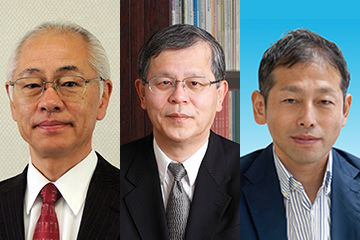
- KUDO Toshihiko (Project Leader, Maruman Computer Service K.K.)
NAKAJI Sigeyuki (Research Leader, Specially-appointed Professor of Hirosaki University)
MURASHITA Koichi (Strategy Leader, Professor of Hirosaki University) - Center of Innovation (COI) Program
- "Center of Healthy Aging Innovation" (2013-2022)
Focusing on disease prevention to create a society where people can live long and healthy lives
Aomori Prefecture has long been at the bottom of the prefectural rankings for average life expectancy. In response, Hirosaki University launched the "Iwaki Health Promotion Project"*1 in 2005 under the slogan "Clear the Stigma of a Short-lived Prefecture." Medical checkups have been offered to the elderly people in the Iwaki area of Hirosaki City for the past ten plus years.
This checkup aims to develop disease prevention methods by detecting early signs of diseases and was expected to contribute not only to clearing the stigma of a short-lived prefecture but also to extending healthy lifespan,*2 which is an issue in Japan.
This activity led to the acceptance as a site for COI STREAM*3 by the Ministry of Education, Culture, Sports, Science and Technology in 2013 and the establishment of Hirosaki University COI (Center of Innovation). A total of 78 institutions (as of March 2022), including companies from diverse industries, universities and research institutions, are participating in the project. The industry-academia-government collaboration team has been strategically engaging in research projects such as the development of disease prediction methods using health big data*4 collected from health checkups and the development of disease prevention methods based on signs of diseases.
One of the achievements was the development of artificial intelligence (AI) that predicts the onset of lifestyle diseases and proposes "easy-to-implement" health improvement plans tailored to each individual (Fig. 1).
The AI was developed using health big data collected in the Iwaki Health Promotion Project, demonstrating its usefulness. It is expected to contribute to health intervention in personalized medicine.*5
*1 Iwaki Health Promotion Project
The project was designed in 2005 in collaboration of Hirosaki University, Hirosaki City (formerly Iwaki Town) and the Aomori General Health Examination Center to prevent lifestyle diseases, maintain/promote health and extend the life expectancy for the residents of the Iwaki area of Hirosaki City.
*2 healthy lifespan
A period of time during which an individual can live without health problems limiting their daily life. The difference between average life expectancy and healthy lifespan in Japan is about nine years for men and about 12 years for women ("Healthy Lifespan in 2019," Ministry of Health, Labour and Welfare, 2019). These years are "unhealthy periods," so to speak, and it is important to narrow this difference.
*3 COI STREAM (Center of Innovation Science and Technology based Radical Innovation and Entrepreneurship Program)
A vision set by the Ministry of Education, Culture, Sports, Science and Technology for the society that should be aimed for 10 years from now. The program designates 18 sites across Japan and is supported by the Japan Science and Technology Agency (JST) as a Center of Innovation (COI) program.
*4 health big data
Big data is a huge group of data containing many different types and formats of data. In this case, it refers to the accumulation of 3,000 items of health information from medical checkups conducted in the Iwaki area.
*5 personalized medicine
Effective treatments with little side effects suitable for each patient's predisposition and condition (tailor-made medicine) and prevention methods (personalized prevention).
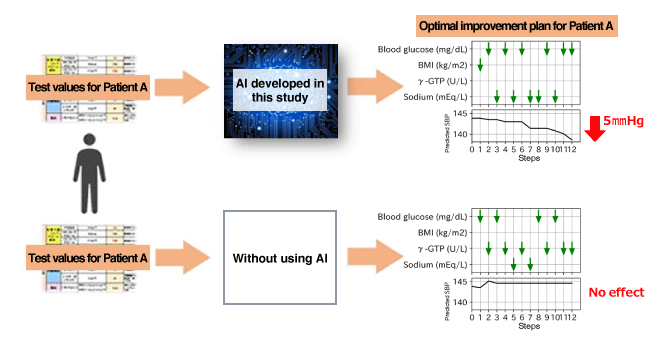
(Provided by Dr. OKUNO Yasushi, Kyoto University)
Fig. 1 Concept of AI developed in this project that proposes health improvement plans
AI proposes the priority of limiting carbohydrate intake, weight, alcohol consumption and salt intake to improve high blood pressure (improvement plan).
Aiming to develop AI to support medical doctors
Japan as a super-aging society faces a variety of challenges ranging from reducing medical costs to improving the health of the elderly, with major issues concerning how to increase healthy lifespans and how to reduce the "unhealthy period," the difference between the average life expectancy and healthy lifespan. Attention is therefore focused on the early detection of diseases and the development of measures to improve conditions while people are not yet ill using the latest technologies such as information and communication technology (ICT) and AI.
A key component of personalized medicine, which has been gaining attention in recent years, is establishing health improvement plans that are acceptable to patients based on their diverse individual health characteristics and preferences. The reality, however, is that proposing such tailor-made health improvement plans relies primarily on the experience of medical doctors. A way to support clinicians in a data-driven way, independent of their experience, is to be sought.
Predictive models created using machine learning technology*6 have recently made it possible to provide diagnostic assistance and predict future diseases based on comprehensive patient information. While such machine learning models of AI can provide excellent predictions, the problem is that the prediction process is unknown to humans, making it a black box. It is difficult to utilize it without making the process clear, as it can be life-threatening. As a result, even when AI predicts a high risk of developing a disease, it has so far been unable to provide a specific plan as to what remedial actions should be taken.
To solve these problems, attention has been focused on the "establishment of a system to detect diseases at an early stage using big data" and the "development of prevention methods based on signs of diseases," which are what this R&D project is seeking to address.
*6 machine learning technology
Technology that learns rules and decision criteria from data to predict and judge unknowns.
Enabling well-being with AI
The project used medical checkup data from the "Iwaki Health Promotion Project" to build an AI R&D database. Models for predicting disease onset for approximately 20 diseases were established to develop personalized algorithms for disease prevention and remediation.
The prediction results of the health improvement plan must be highly beneficial and "easy to implement" for patients. Therefore, to improve health, efficient improvement measures focusing on specific items were considered, instead of intervening on all items related to exercise, drinking restrictions, eating habits, etc. In addition to a high-performance machine learning model, AI was developed that can propose "easy-to-implement" health improvement plans tailored to each individual, using a hierarchical Bayesian model*7 (Fig. 2).
This AI was developed using health big data collected in the Iwaki Health Promotion Project of Hirosaki University COI. As a result, the developed AI was found capable of providing individualized improvement plans based on the health condition of an individual.
*7 hierarchical Bayesian model
This is a kind of statistical modeling technique. This method learns based on trends both in the entire data and in individuals (or groups) to represent data with multiple mixtures of distributions.
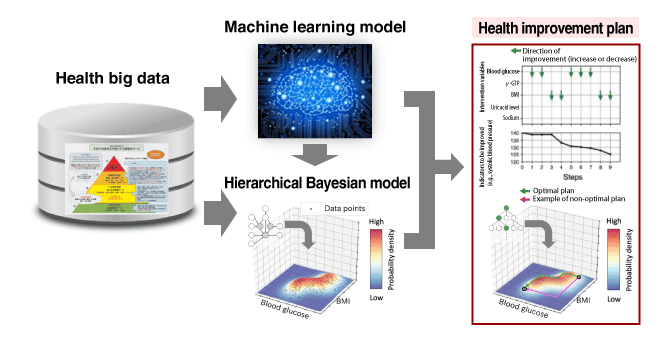
(Provided by Dr. OKUNO Yasushi, Kyoto University)
Fig. 2 Method for creating health improvement plans
This method uses a modeling technique called the hierarchical Bayesian model to evaluate "ease of implementation." In addition to the normal machine learning model, this hierarchical Bayesian model can propose health improvement plans that go through realistic combinations of test values.
Creating "well-being power" through industry-academia-government-private sector collaboration
This project has been seeking to create a new future society under the theme of "lifespan revolution through the creation of innovative 'well-being power' to realize true social innovation." This is also the realization of "preventive healthcare concerning risks"*8 to realize "healthy aging and a life with a sense of happiness" instead of "as long a life as possible." A social system where the elderly can enjoy their lives while engaging in economic activities with a sense of security is also planned through the "development of a dementia support system."
Besides the "AI that proposes health improvement plans," the project has been involved in various research themes with private companies based on the accumulated health database, while still accelerating the social implementation of the research achievements (Fig. 3).
Activities led by Hirosaki University as the core will continue to proactively promote open innovation, aiming to realize innovations that participating institutions would not be able to achieve alone (Fig. 4).
*8 preventive healthcare concerning risks
This is a medical service focusing on the prevention of diseases, whereas conventional healthcare has treated people after they have become ill.
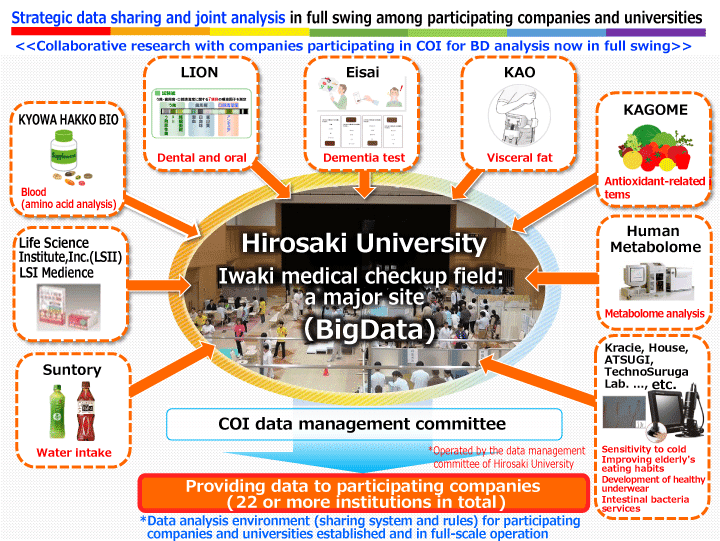
Fig. 3 Initiatives led by Hirosaki University as the core with various institutions
The center is collaborating with various companies on diverse themes such as oral hygiene, dementia and visceral fat.
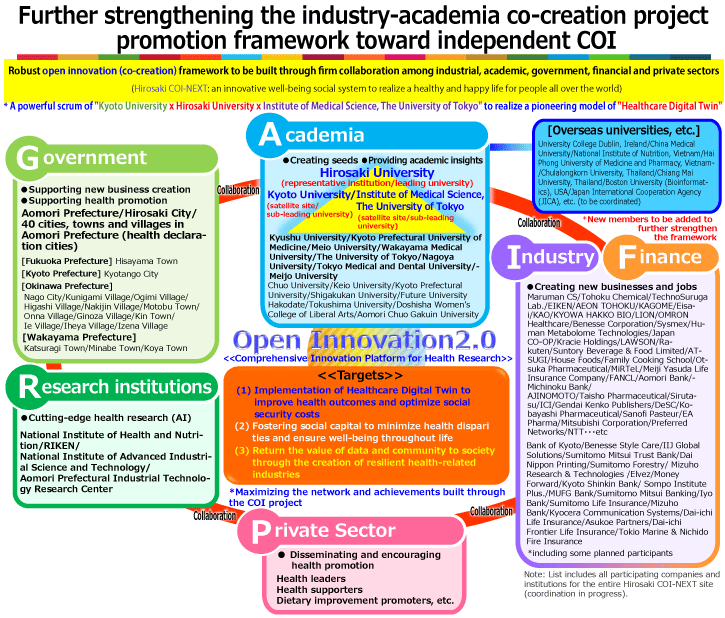
Fig. 4 Open innovation to be promoted further in the future
Not only collaboration among research institutions but also a broad network of local governments and private groups will be formed to share ideas and wisdom.
- Life Science
- Research Results
- Japanese
